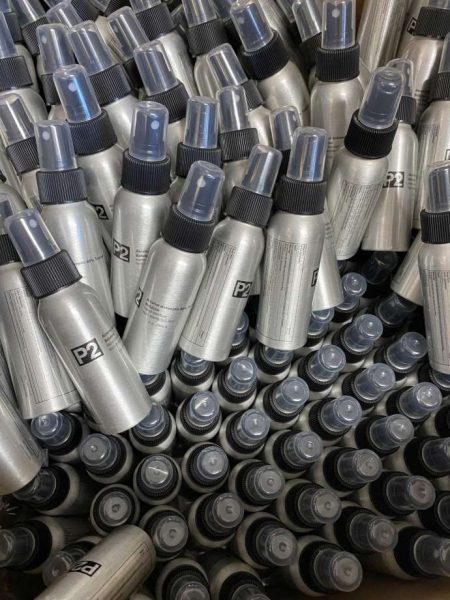-

P2 Science delivered jugs of hand sanitizer to New Haven-based agency All Our Kin, which then distributed the sanitizer to their clients.
P2 Science delivered jugs of hand sanitizer to New Haven-based agency All Our Kin, which then distributed the sanitizer to their clients.
Photo: Contributed Photo
P2 Science delivered jugs of hand sanitizer to New Haven-based agency All Our Kin, which then distributed the sanitizer to their clients.
P2 Science delivered jugs of hand sanitizer to New Haven-based agency All Our Kin, which then distributed the sanitizer to their clients.
Photo: Contributed Photo
If you expect essential workers to stay on the job during a pandemic, then some support is, well, essential.
But providing that can be complicated beyond belief, especially when essential workers range from doctors to nurses to grocery store baggers to trash collectors. Beyond PPEs, the pandemic has taught us that the smallest things can mean all the difference. In your wildest dreams (or worst snowstorm), no one could have predicted the importance of an unbroken toilet paper supply chain. Nor could you have imagined how tragic could be the lack of a simple thing like hand sanitizer.
How important is sanitizer, that little bottle you used to throw to the bottom of your bag? It is everything.
Here’s an example: While essential businesses have (cautiously) remained open, the state has mobilized to find essential workers reliable childcare.
According to the state Office of Early Childhood, 27% of child care centers and 59% of family day care centers remain open in the state. Family centers are generally smaller operations with owners who are onsite. If they do not stay open, they do not remain in business, said Maggie Adair, the office’s director of government and community relations.
According to recent state guidance, child care providers are taking steps to make their centers as safe as possible, and that includes sanitizing surfaces frequently. The office created a multi-pronged program to secure funding, training, and support for childcare centers. The state also began providing, with a $3 million gift from Dalio Philanthropies, free childcare for hospital workers at centers within three miles of every Connecticut hospital.
A long list of initiatives have been launched to make sure the state’s smallest citizens are well cared for, but without hand sanitizer, even the state’s impressive effort is moot.
So some local companies stepped up.
Robert Bedoukian, whose father Paul founded the internationally-known Bedoukian Research Inc., of Danbury was doing the same thing, asking around to see how his company could help. The trade organization, Fragrance Creators Association, worked with the U.S. Food & Drug Administration to relax the standards for the production of sanitizers and disinfectants, so long as companies worked within certain guidelines. (Distilleries, too, began producing sanitizers. The same base that goes into drinks such as gin were converted into the all-important sanitizer.)
In fact, throughout industries worldwide, companies that normally produce products from alcoholic beverages to fragrance for perfume houses were switching over to more mundane – and life-saving — products. The switch for the manufacturers and labs wasn’t all that difficult, though the industry was every bit as challenged to find the appropriate products as are rest of us.
The biggest challenge for his company, Bedoukian said, was finding isopropyl alcohol, which is an effective disinfectant against COVID-19. Otherwise, “this is actually much simpler than what we normally do,” he said. “We do pretty complicated chemistry.”
Since switching over, Bedoukian’s company has distributed more than 1,000 gallons of hand sanitizer to about 10 area non-profits and organizations, he said. The company just added the state police as a recipient of their largesse. Recently, he said someone from an area nursing home contacted the company, and they will help there, as well.
Patrick Foley is co-founder and chief scientific officer of P2 Science, a renewable chemistry company that has a manufacturing plant in Naugatuck, and a lab in Woodbridge. Early on, Foley and others in his company began reaching out to see what they could do.
They donated their masks to Naugatuck’s police department. P2 Science was also able to get hand sanitizer and containers to local workers, and through Foley’s mother-in-law, Jaime Mills, a civil rights attorney and former senior policy advisor to former Gov. Dannel P. Malloy, he was eventually connected to All Our Kin, a New Haven-based organization that trains and supports community child care providers. P2 delivered jugs of hand sanitizer to All Our Kin, which then distributed the sanitizer to their clients. P2 Science also donated several hundred spray bottles, and add those to the list of things that are tough to come by, said Foley. As he says, “every single supply chain is disrupted.”
“We are just trying to do whatever we can to keep the social fabric together in these crazy times,” said Foley.
We remain in quarantine. However long this takes, it will be precisely this that gets us through: Companies and people deciding to do something entirely different – and essential.
“It’s a big morale booster, for our workers who are struggling through wearing masks and keeping six feet apart and worrying all the time,” said Bedoukian. “It’s been a big morale booster, to not feel helpless.”